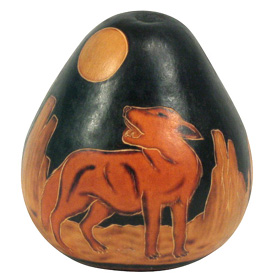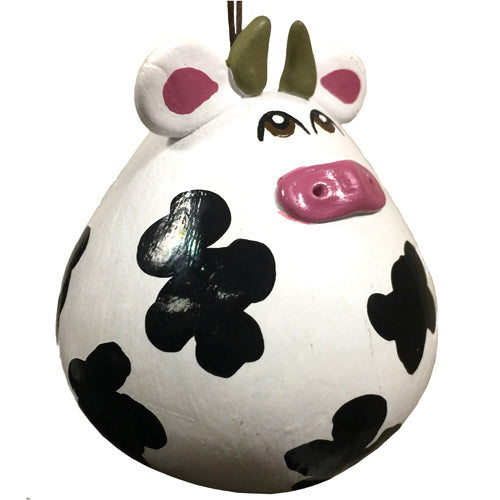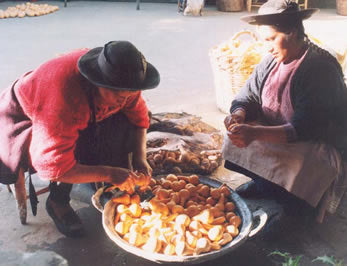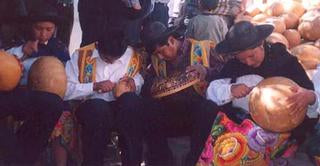OWP
Hand-Painted Gourd & Ceramic Cow Ornament
Hand-Painted Gourd & Ceramic Cow Ornament
Couldn't load pickup availability
This unique hand-carved gourd cow ornament makes both a great gift at the holiday time of the year and is a wonderful home accent year-round. This gourd ornament is a 3 dimensional Lady Bug w/ ceramic accents hang them on your tree, in the window, or set on a mantel these ornaments are a beautiful way to help provide for artisans and their families.
Gourds are a natural and uniquely shaped vegetable, similar to a pumpkin or squash. As such, designs, shapes, and dimensions will vary slightly.
- Height measures approximately 2-3/4"
- The diameter measures approximately 2-1/2"
These ornaments are hand-carved in Peru and Fair Trade imported.
Peruvian artisans have practiced the art of gourd-carving for more than 4,500 years, transforming a simple squash into intricately designed bowls, boxes, windchimes, birdhouses, purses, vases, and other bits of home decor. The twin villages of Cochas Grande and Cochas Chico, where our artisans Raquel and Esperanza live, work, and run gourd-carving workshops to create local jobs, are the center of this ancient art.
Over the centuries, artisans have found unique ways to craft gourd decor, including scratching, fine-line hatching, pyro engraving, and carving. Naturally, the details and designs have changed, but contemporary artisans remain inspired by Peru's rich traditions.
Please read our extended description below by clicking on "About the Artisans" for more information on how these wonderful eco-friendly items are made, and for more information on the talented artists who make them.
About the Artisans
About the Artisans
Esperanza carves her gourds wearing the colorful and traditional Huanca skirts, and its quite common to find her carving surrounded by her husband, sons, brothers, nephews and brothers-in-law. "My biggest dream is that all will have work and that all the families will have a better future," she says.
Raquel's workshop also creates work for about fifteen families and manages orders from the main office. Like Esperanza's workshop, Raquel's artisans share the work so that parents, children and grandparents collaborate together on large orders. "This craft we inherited from our ancestors, grand parents, and parents to the present," Raquel tells us. "Each generation improves the art and it continues to grow with future generations."
"If we have fun in our work, it will teach us to know more of our culture," Esperanza adds. "Through the created drawings we are inspired to do many things. The tradition of gourd carving helps to shape the culture and customs of the town."
The Process of Gourd Carving
After the gourds are harvested, the artisan removes the outer green skin with a dull knife to expose the lighter brown color underneath. This will become his/her canvas. The gourds are cleaned and dried in the hot Peruvian sun.
 After drying, the artisan draws his/her initial design in pencil, then uses a carving tool to remove small pieces of gourd, creating a 3-dimensional version of the original design. Next, the artisan burns the pattern with a glowing ember, usually a feather-shaped piece of Quinual wood that's been heated over a fire, to establish contrast between the carvings and the gourd. The artisan can vary the intensity of the heat by blowing on the ember; the harder the artist blows, the darker the burn.
After drying, the artisan draws his/her initial design in pencil, then uses a carving tool to remove small pieces of gourd, creating a 3-dimensional version of the original design. Next, the artisan burns the pattern with a glowing ember, usually a feather-shaped piece of Quinual wood that's been heated over a fire, to establish contrast between the carvings and the gourd. The artisan can vary the intensity of the heat by blowing on the ember; the harder the artist blows, the darker the burn.
Having obtained the color, the artisan washes the gourd to remove
the pencil marks and polishes the finished piece with a natural wax. Sometimes, the artisan applies an oil/charcoal mixture to the gourd's carved surface. The dye adheres any part of the gourd where the outer skin has been removed, yet wipes clean from the gourd's smooth surfaces. This is why some carved gourds have a black background.
Materials
Materials
Care information
Care information
Share



Subscribe to our emails
Subscribe to our mailing list for insider news, product launches, and more.




 Cochas Chico and Coches Grande, twin farming villages nestled in the Andean mountains of Huancayo Peru, are home to a rich tradition of gourd carving. It's also home to Esperanza Palomino and Raquel Sabastian Rojas, two women who have established small fair-trade businesses to help create new jobs for the artisans in their village. Besides creating new jobs for artisans aged ten to sixty, both women manage work distribution from the main office to give priority to the families with the greatest need.
Cochas Chico and Coches Grande, twin farming villages nestled in the Andean mountains of Huancayo Peru, are home to a rich tradition of gourd carving. It's also home to Esperanza Palomino and Raquel Sabastian Rojas, two women who have established small fair-trade businesses to help create new jobs for the artisans in their village. Besides creating new jobs for artisans aged ten to sixty, both women manage work distribution from the main office to give priority to the families with the greatest need.